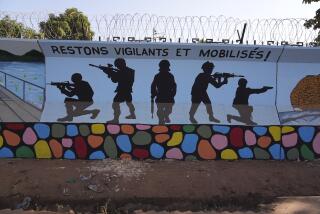Witness Recalls Bloody Retribution by Serbs
- Share via
SUVA REKA, Yugoslavia — When war crimes investigators reach this southern Kosovo town, and the inhabitants hope it will be soon, they will surely be directed to look behind an imposing three-story brick house, set back from the street not 100 yards from the police station.
Pressed into the gravel near the back wall are many rain-soaked rags: here a bit of plaid shirt, there the cuff of dark woolen slacks, the edges charred by fire. A little digging reveals the cracked face of a wristwatch, blackened coins and a single ash-encrusted key.
The wall itself is perforated a few feet off the ground by silver-dollar-size holes. There are also dark spots and blotches the color of motor oil, as though some sloppy workman had flicked his paintbrush at it.
This is all that remains at the scene of the massacre of the Berisha men, eight members of one of the richest ethnic Albanian families in town. On the morning of March 25, according to witness Misin Berisha, they were ordered to kneel in front of the wall, holding their fingers in their ears. Then a Serbian gunman calmly squeezed the trigger of his automatic rifle and kept firing until they had fallen, one upon the other, in a bloody heap.
What had the Berisha clan done to deserve this fate? The people of Suva Reka think they know: The owner of the house, Nezat Berisha, had rented it out this year to serve as the local headquarters for monitors from the Organization for Security and Cooperation in Europe.
The OSCE monitors had come to Suva Reka to help protect the Kosovo Albanian majority who lived here. But once they left, just before the NATO bombings began March 24, people who had cooperated with them were high on the list for Serbian retribution.
“Fifteen minutes. You cannot imagine, it was so fast,” said Misin Berisha, a 36-year-old neighbor not related to the slain men, who dissolved into tears as he told journalists about their deaths.
One of the first tasks for refugees returning to Kosovo over the last week has been trying to locate the bodies of their slain neighbors and relatives to give them a proper burial, and if possible to safeguard evidence for the international tribunal charged with bringing war criminals to justice.
To have survived means to carry that obligation, said Misin, who said he feels he became “like a brother” to those he saw killed.
Yet he fears it is too late for justice to be done.
“It’s almost not worth an investigation,” he said in a voice trembling with anger. “Every one of those criminals has run away, and now they will never catch them.”
The day the first NATO bombs fell on Kosovo, Misin said, a group of Serbian police came to Nezat Berisha’s house to arrest him. But his wife managed to secure his freedom by paying a bribe of 50,000 German marks, or about $30,000.
The next day, however, police returned. This time there was no hesitation. They killed a man in front of the house and then pulled eight others--Nezat, his brother and their sons--out into the backyard and ordered them to kneel by the wall. Their wives and children were told to run, with police firing automatic weapons into the dirt in front of them to move them along, Misin said.
Misin pointed to the window of a nearby house, where he and his wife, Shyqrite, hid and watched the killings.
“Someone screamed, ‘Please don’t kill my son,’ but they did it anyway,” Misin said.
The victims’ last minutes were taken up with desperate pleading, he recounted. Some of the men pulled wads of money from their pockets and begged police to take it to spare their lives. Then one of the men, Faton Berisha, began wailing “Ahhhhhh” at the top of his lungs. At that, the killer fired his machine gun and mowed down the entire group.
As a last act before departing, the police set fire to the house. The burning roof collapsed and partially burned the bodies, Misin said.
He and his wife stayed hidden for the next two days and then made their way to Albania. They returned only Friday and were keeping watch over the massacre site.
Serbian authorities had obviously gone to some trouble to try to eradicate the evidence, he said. Sometime over the course of the past months, the remains must have been burned again, because a large patch of ground looked scorched, and the remnants of evergreen branches, apparently used for fuel, were scattered around. There are probably no remains left to be found.
As Misin was telling the story, another returnee, Jashar Gashi, silently placed a red rose in one of the bullet holes as a memorial.
Gashi spent the last two months sheltering with Kosovo rebels in the mountains and acting as a courier for them. While he agreed with Misin that international investigators in many cases will have little to go on, he urged that they at least try to find those who are guilty.
He noted that the units in the area that day were the local police from nearby Prizren or internal security units from Krusevac in Serbia proper. The killer was probably from among those units, he said.
More to Read
Sign up for Essential California
The most important California stories and recommendations in your inbox every morning.
You may occasionally receive promotional content from the Los Angeles Times.













